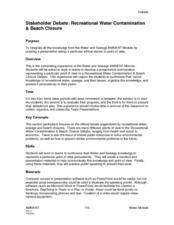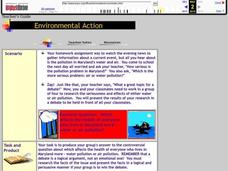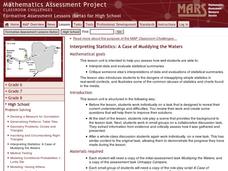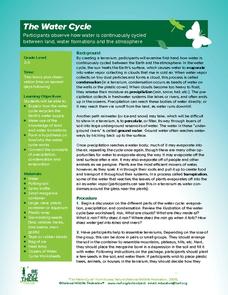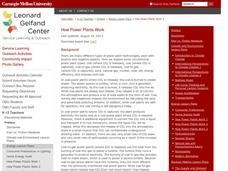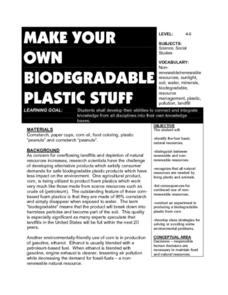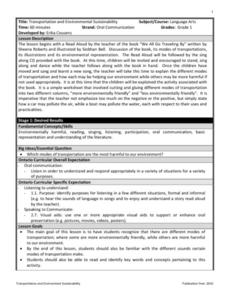Marine Institute
Water Pollution
Sixth graders investigate the various types of pollutants found in water and ways to help prevent water pollution. Through a hands-on experiment, students create samples of polluted water by mixing water with vegetable oil, dirt, and...
Safe Drinking Water Foundation
Making a Difference
After learning about the effects of water pollution, your class will discuss ways to make people in their community aware of the importance of water conservation. Then, your young environmentalists will write a letter to the local...
Curated OER
Recreational Water Contamination and Beach Closurew
Learners work in teams to develop a presentation and handout representing a particular point of view in a recreational Water Contaminationand Beach Closure Debate. They synthesize their knowledge of recreational water, sewage, and their...
Curated OER
Environmental Action
Middle schoolers debate one another. In this pollution lesson plan, pupils work in teams to debate which is more serious, air or water pollution. They research their topic to come up with valid points to justify their side of the debate.
Curated OER
Water Pollution Experiments
Fifth graders conduct experiments in simulated water pollution using a box of items to hold "pollutants"and an aquarium, representing a waterway. They observe how "rain" from a watering can poured into the box washes the pollutants into...
Safe Drinking Water Foundation
Ask an Engineer
A wrap-up to the unit, young environmentalists discuss and write about the difference in perspectives of a water keeper and water treatment engineer.
Safe Drinking Water Foundation
I Want to Be an Engineer
Environmentalists turn into engineers! Your class explores the perspectives of an engineer and water keeper, including the necessary steps that are taken in order to build a water treatment facility.
Curated OER
Interpreting Statistics: A Case of Muddying the Waters
Is river pollution affecting the number of visitors to Riverside Center, and is the factory built upstream the cause of the pollution? Let your class be the judge, literally, as they weigh the statistical evidence offered by the factory...
Curated OER
Clean Water vs. Dirty Water
Students study the importance of clean water to the survival of organisms and what activiities and material pollute water. They measure the temperature of water samples and create a class graph.
Curated OER
Seepy Sandwich
Students study how water infiltration can carry pollution underground. In this water infiltration lesson, students conduct an experiment on water infiltration and underground pollution.
Curated OER
The Water Cycle
Students are introduced to the components and importance of the water cycle. They are shown how groundwater moves using a model. Students list 9 places on earth where water is found. They define the terms cycle and water cycle.
WE Charity
High School–Module 2: Circular Economy and Nature
Everyone's heard the popular slogan reduce, reuse, recycle, but there may be a better way to talk about sustainability. Using the second lesson from the five-part WE Are Innovators—High School Modules series, learners explore issues...
Carnegie Mellon University
How Power Plants Work 2
In this second of three lessons on power plants, future engineers find out how we generate electricity and how coal-powered plants operate. They work in small groups to make electromagnet generators to light LED bulbs. A set of...
Carnegie Mellon University
How Power Plants Work 3
Double, double toil and trouble, fire burn and cauldron bubble! Find out what drives a turbine to generate electricity and whether or not it has an impact on the environment. A discussion and lecture is divided by a hands-on activity in...
Earth Day Network
Staying Green While Being Clean
Clean up the environment with a lesson that focuses on replacing hazardous cleaning supplies with green, environmentally-friendly products. Using a dirty patch of surface as a control area, kids clean other parts of various surfaces...
NOAA
Seafood and Human Health
Whether your young biologists realize it or not, humans play a significant role in marine ecosystems. To help them understand this fact children first create graphical representations that show homo sapiens' place in marine food chains,...
Cornell University
Fibers, Dyes, and the Environment
Nanofibers can be made through electrospinning or force spinning in order to reduce the negative impact on the environment. Pupils study the role of fibers and dye on the environment through a series of five hands-on activities. Then,...
Curated OER
Local Environmental Issues: Pollution
Third graders discuss the ways in which human interaction with the environment and production of waste products contribute to pollution. Through a pollution demonstration, they explain how various groups of plants and animals can be...
Curated OER
Water Quality Monitoring
Pupils comprehend the four parameters of water quality. They perform tests for salinity, dissolved oxygen, pH and clarity or turbidity. Students comprehend why scientists and environmental managers monitor water uality and aquatic...
Curated OER
Make Your Own Biodegradable Plastic Stuff
Students identify the four basic natural resources. They distinguish bettween renewable and non-renewable resources. Pupils recognize that all natural resources are needed by living plants and animals. Students list consequences for...
Redefining Progress
Have and Have-Not
Is there a correlation between a country's wealth and the extent of its ecological footprint? What exactly constitutes an ecological footprint, and how does one country stack up against the rest? This is a unique lesson to incorporate...
Curated OER
Transportation and Environmental Sustainability
After listening to the book, We All Go Traveling By, 1st graders discuss different modes of transportation that they see out in the world, and the environmental impacts of each one. Kids work together to create a list of the types of...
Curated OER
Environment: Just Around the Bend
Students decipher landforms on a map and corresponding satellite imagery. They consider the impact of pollution on agriculture and water. They draw diagrams demonstrating how pollution works its way into the food source.
Curated OER
Land Use Change Introduction
Students discuss the major changes that have taken place in the Hudson Valley over the past 400 years. They use aerial photos to describe major trends in Dutchess County. Students view a PowerPoint presentation. They work in small groups...




